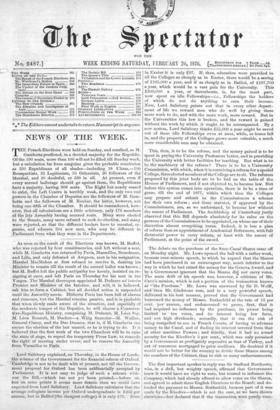Lord Salisbury explained, on Thursday, in the House of Lords,
the scheme of the Government for the financial reform of Oxford. Cambridge is not to be dealt with at present, not till the Govern- ment proposal for Oxford has been sabltantially accepted by Parliament. It is not easy to judge of such a scheme with- out the Bill,—which has not yet been printed,—before us, but on some points it seems more drastic than we could have expected from Lord Salisbury. Lord Salisbury calculates that the average collegiate income per Oxford undergraduate is £203 per annum, but in Balliol (the cheapest college) it is only £75. Even
in Exeter it is only £97. If, then, education were provided in all the Colleges as cheaply as in Exeter, there would be a saving of £165,000 a year, and if as cheaply as in Balliol, of £197,700 a year, which would be a vast gain for the University. This £200,000 a year, or thereabouts, is, for the most part, now spent on idle Fellowships—i.e., Fellowships the holders of which do not do anything to earn their income. Now, Lord Salisbury points out that in every other depart- ment of life we reward men who do well by giving them more work to do, and with the more work, more reward. But in the Universities this law is broken, and the reward is gained without the work by which it ought to be accompanied. By a new system, Lord Salisbury thinks £55,000 a year might be saved out of these idle Fellowships even at once, while, as leases fall in, and the property of the Colleges grows more valuable, a much more considerable sum may be obtained.


































